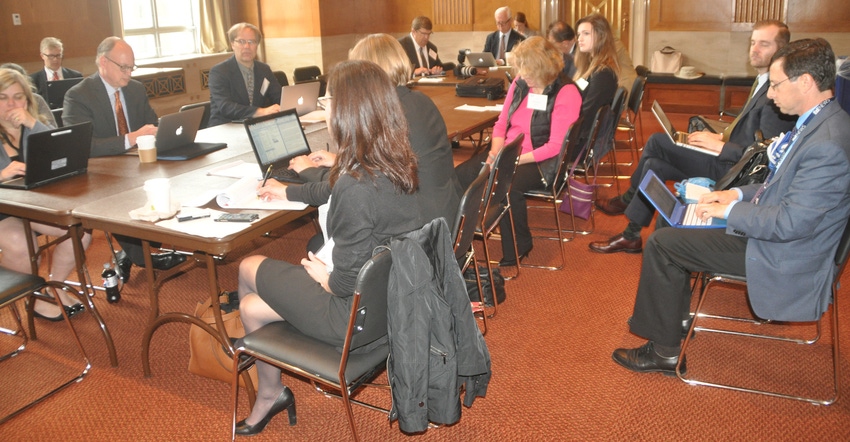
All four agricultural committee leaders in Congress are in agreement that a farm bill will be passed and are reasonably optimistic that it can be done this year.
"There's a lot of support for getting it done as soon as possible, both to help our farmers who are in crisis and to provide stability and predictability for farmers and their bankers going forward," House Ag Committee Chairman Mike Conaway, R-Texas, told members of the North American Agricultural Journalists during their annual spring meeting in Washington, D.C., in late April.
Part of the optimism for getting a farm bill done stems from the overall bipartisan cooperation in both ag committees which are arguably the least partisan of any congressional committees. Both committees have a number of longstanding members who have weathered several past farm bills together.
On the Senate side, Pat Roberts and Debbie Stabenow, in alternating roles as chairman and ranking member, passed the 2012 Farm Bill not just once but twice, and have already held field hearings in both their home states of Kansas and Michigan.
On the House side, Ranking Member Collin Peterson and Chairman Conaway likewise have a long history of working in the interest of agriculture ahead of the ideology of party.
All four leaders promise that there will be ample opportunity for rank-and-file farmers as well as farm organization leaders, rural community leaders and agribusiness leaders to be heard as the process moves forward this summer and fall.
 Pat Roberts: 'We will have differences, but we will work it out'
Pat Roberts: 'We will have differences, but we will work it out'

Roberts started his remarks with an expression of gratitude to members of the ag media for their work.
"There is a lot of misinformation about agriculture out there, and I'm glad we have people to tell the real stories of farming and ranching and the challenges that our people face," Roberts said.
He spoke of this spring's Starbuck wildfire, the largest in American history on non-federal land.
"I came away from visiting there so encouraged by the response from all over rural America to reach out and help each other," he said. "We need some federal help, and we will hope that it is prompt as it should be."
Of the upcoming farm bill, Roberts said the Senate committee is in "listening mode" with field hearings in Kansas and Michigan.
"What our farmers and their bankers need is stability and dependability," he said. "In moving forward, we will have differences, but we will work it out. We can do it because we need it done. Prices are so bad, and we don't have the trade policy in place to improve prices. The challenge is to get new trade pacts to replace TPP [Trans-Pacific Partnership]. We haven’t paid serious attention to the budget in years. We'd better find a way to sit down and work to shape it so that it works for all farmers. We know money will be hard to come by, but there are producers who need assistance, and we have an obligation to get that assistance to them."
When questioned about his thoughts on the administration's threat to impose a 20% tariff on imports of Canadian softwood lumber in response to Canada's actions to protect its domestic dairy producers, Roberts responded, "I try not to think about it."
 Debbie Stabenow: 'We will get a farm bill, and we will fight budget cuts'
Debbie Stabenow: 'We will get a farm bill, and we will fight budget cuts'

Stabenow told NAAJ members that her home state of Michigan is second only to California in diversity of crops. The state produces fruits and vegetables as well as corn, wheat and soybeans.
"I always say we don't have an economy unless somebody makes something and somebody grows something," Stabenow said.
She added that she was pleased with the strong support for Ag Secretary Sonny Perdue and that she hopes having him in place will help spur more nominations in the more than 200 support positions that remain open.
"As we move forward with a farm bill, we need those people in place. They are the people we turn to for answers to questions, for research and advice," she said.
She said she remains very concerned about the lack of an adequate safety net for dairy farmers.
"I think overall we have the right structure in the current farm bill," she said. "But we didn't get the right target levels and protections for our dairy farmers. We need to fix that."
She said she is hoping to get quick action on short-term relief for dairy farmers and a long-term fix in the 2018 Farm Bill and suggested the possibility that some form of crop insurance could be worked out for dairy.
"In the 2014 bill, we were able to extend crop insurance to cherry growers, and it helped Michigan growers this year," she said. "A few years ago, we had a warm spell in February, and all trees were in full bloom when we had a hard freeze. It wiped out the crop, and it was a disaster for farmers. The same thing happened this year. I started calling growers and heard again and again, 'Oh, I was able to get insurance. I will be OK.' Crop insurance works."
Her greatest concern, Stabenow said, comes in the budget proposal from President Donald Trump that calls for a 21% cut to the USDA budget, the elimination of the rural water and sewer programs, cuts to the rural small business loan program, rural development programs and massive cuts to Farm Service Agency personnel, along with the closing of some county offices.
"This proposal would be devastating to rural America," Stabenow said.
She said she is also concerned about trade policy and backing out of trade agreements that have been highly successful for agriculture.
"We need to take down trade barriers. Agriculture needs new markets," she said.
She also spoke in favor of expanding Conservation Reserve Program acres, but said that the committee will be forced to work with existing dollars and will face a strong push for conservation programs on working lands, like the Conservation Stewardship Program and the Environmental Quality Incentives Program.
Stabenow said she is confident that the 2018 Farm Bill will get done, however; and she expects it will be done this year.
"I expect we will see the same strong bipartisan work we saw last time in the next bill," she said. "There may be some tough negotiations, especially on amendments, but we will be very serious about moving it forward."
 Mike Conaway: 'Farm bill will be done, and done on time'
Mike Conaway: 'Farm bill will be done, and done on time'

Conaway said the groundwork has already been laid in House subcommittees, and he believes the committee is on track for completing a farm bill on time.
"We will be doing a lot of listening sessions at community gatherings around the country this summer," he said. "We want to hear from rank-and-file farmers as well as farm group leaders and agribusinesses. As far as I am concerned, there is an easy explanation why we need a farm safety net and that is to control the cost of food. I think of a single mom spending 35% of her income on food. The only flexible thing in her budget is food."
Conaway said the safety net also provides the certainty that bankers and other creditors need to work with farmers during economic downturns like the one they are experiencing now.
On another topic, he assured journalists that his duties on the intelligence committee in the probe into Russian interference in the 2016 election will not detract from his ability to oversee the farm bill passage.
"I know how to multitask, and I have a great staff on both committees to carry on the work that needs to be done," he said.
Conaway said he expects debate over the nutrition title and is well aware that Speaker Paul Ryan wants a broader look at welfare reform.
"I think we can all agree that we need to take care of children, the frail elderly and the disabled," he said. "As for the working poor, we need a way to help them move up and out of the need for assistance. We have asked for the same resources in the next bill as we have in the current bill."
He applauded the confirmation of Sonny Perdue on a bipartisan vote.
"He will be drinking out of a fire hose initially," he said. "But I hope he will settle in and emphasize trade and the need to get bilateral agreements as quickly as possible to replace TPP, which would have been really, really good for agriculture. Moving forward, ag people are going to have to remain vigilant to make sure ag interests are protected."
 Collin Peterson: 'Monkeying around with SNAP will cause problems’
Collin Peterson: 'Monkeying around with SNAP will cause problems’

Peterson says he would like to see extra money for programs in the 2018 Farm Bill because he thinks it's going to be needed to see farmers through the price problems they currently face.
"I know the chairman has asked that it not be cut; I think we need more money. This year farmers survived despite low prices because yields were great last year. If yields are not so great in the next harvest, I think we have an inadequate safety net," he said.
At the very least, he said, the 2018 bill will have to fix the safety net for dairy and cotton, the two segments that are now in the worst trouble.
He said there are a number of tweaks that can be made to the dairy program that will make it work for farmers, and he hopes the bill get those done.
On the trade conflict with Canada, Peterson said he does not think Canada will budge from its long-held position of supply control of its domestic dairy interest.
"We agreed to allow the Canadians to keep their supply management in NAFTA [North American Free Trade Agreement]," he said. "Ultra-filtered milk was a way to get sales in Canada. The Canadians saw that move and shut it off. It will have to be resolved by the World Trade Organization."
He went on to say he thinks the dairies affected by the cutoff will find another market for their milk. "I would be very surprised if those 75 dairies can't find a market for that milk elsewhere," he said.
He said that he sees very little change in crop insurance and that efforts to limit subsidies on premiums will likely fail.
Finally, he said, he believes that a farm bill will get done and that it will work for dairy and cotton going forward.
"I think the only really problem will come if somebody decides to do a lot of monkeying around with SNAP [Supplemental Nutrition Assistance Program] or do something dumb like separate it from the farm bill. That would cause a major problem in the House, and I think it would in the Senate as well," he said. "You have to realize that 85% of the people who are getting SNAP are not eligible for work anyway. They are kids or senior citizens."
On expanding CRP, Peterson said he would be in favor of both expanded acres and of opening all CRP acres to haying and grazing.
"The best thing you can do to maintain grassland is to graze it," he said. "The only real problem is that much of CRP land is not fenced. But there might be ways to wring money out of the current system to help with that. Of course, how the Congressional Budget Office would score that could be a problem.
"I also think that there is too much emphasis on continuous CRP rather than normal signup. And we do need more acres. The answer to low prices is to take land out of production. That worked in the 1980s. Then when prices recovered, we agreed to drop the cap on CRP to 24 million acres and that picked up more money for CSP and EQIP. Now we have low prices again, and we need to raise that cap."
About the Author(s)
You May Also Like




